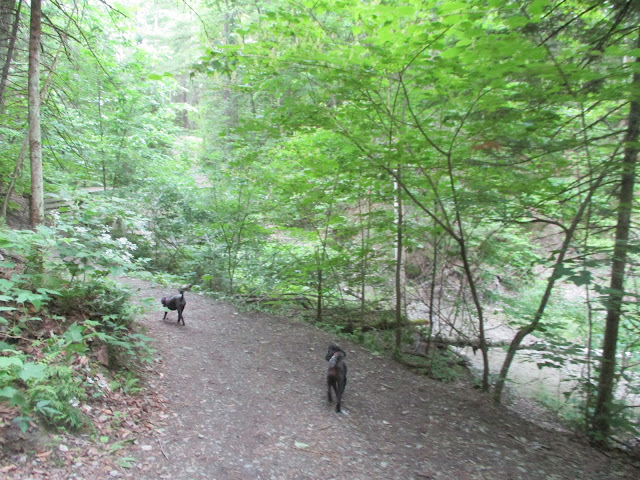That settles it, that old ant colony that has steadily interfered with one of our garden beds over the last few summers will really have to go. One by one its inhabitants have managed to destroy the annuals I've planted in their nearby vicinity. I thought that by keeping the area directly adjacent their immediate nest, they might return the compliment and respect the right to live of the plants surrounding it, but it's not to be, it seems.
They're due a treatment. One that will work. I've tried baking soda/sugar, but haven't noticed it's made any difference. Mostly, no doubt, because of the sheer volume of the colony inhabitants and the fact that each time I've applied it, there's been rain shortly afterward. Well, it seems we'll have to wait before applying the commercial product we bought, since the week's forecast is for one day of rain after another. The product is diatomaceous earth, non-toxic, not chemical, but presumably lethal to soft-bodied creatures.
It's sad, in a way, since ants are for the most part industrious creatures and but for carpenter ants and those who destroy crops and are known to be pests like fire ants that exist elsewhere, have a right to their place in the ecosystem. Just not in my garden. Or, for that matter, in our homes. Irving hates to destroy the lives of insects and will instead remove any that might enter, from the house.
A day of high humidity, heavy overcast, light wind and cooler temperatures. Perfect for working in the garden. But since rain was forecasted, and we could actually sense it, we thought a ravine tramp with Jackie and Jillie should be the first order of business early this afternoon. We did linger in the garden briefly before setting off. Long enough to appreciate the appearance of the Siberian irises which had bloomed weeks earlier in the backyard.
And to watch as bees made love to the growing patch of Mountain Bluet in the garden on the front lawn, flitting from flower to flower, relieving them of pollen. For many years there was a beehive in a hollow of one of the largest old pines in the ravine. One winter, a pair of black squirrels decided to inhabit the nest. We discovered hundreds of dead bees scattered on the snow in front of the pine, and we speculated that the bees, hibernating during the winter cold, were tossed out of their hive by the squirrels who took over the nest for the next two winter seasons.
There's more than ample to keep bees busy in the ravine, with wildflowers and flowering fruit shrubs in full array now, from raspberry canes to thimbleberry shrubs. The thimbleberries bloom later than the raspberries, but they ripen into sweet fruit in the opposite order. The large, bright pink blooms of the thimbleberries catch the eye, calling out for notice.
It's also hard not to notice large patches of Oxeye daisies now in bloom in the forest, mostly along the banks of the creek, in the pollinating meadow and alongside the trails. They and the fleabane with its much smaller flower heads in pale pink not white like the daisies, both have yellow centres.
Jackie and Jillie had their usual run-abouts along the trails, alternating with poking about off-trail on the ravine slopes, sniffing out interesting objects and substances that never fail to capture their olfactory curiosity. If one finds something truly interesting, the other will be quick joining in. There are times when their interests are completely innocent and other times when intervention is required. Without doubt our two little dogs share the opinion that their humans are peculiarly inclined.








No comments:
Post a Comment